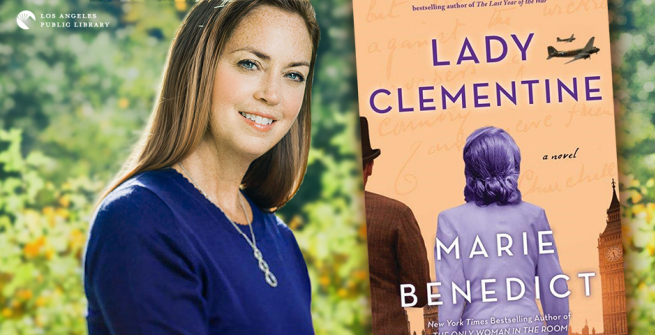Marie Benedict is a lawyer with more than ten years’ experience as a litigator at two of the country’s premier law firms and for Fortune 500 companies. She is a LibraryReads Hall of Fame Recipient and a New York Times bestselling author. Her novels include The Other Einstein, Carnegie’s Maid, and The Only Woman in the Room, about which she spoke with Daryl Maxwell for the LAPL Blog in 2019. Her latest novel is Lady Clementine and Benedict recently agreed to talk about it for the LAPL Blog.
What was your inspiration to write about Clementine Churchill?
I encountered Clementine Churchill while I was knee-deep in World War II research for my last novel, The Only Woman in the Room and kept bumping into Winston Churchill—you know, the ubiquitous cigar, the Homburg hat, the famous speeches, and the “V” for victory sign. I couldn’t help but wonder about his family, his wife in particular. While I do not profess to be a Winston Churchill expert, I did find it peculiar that I knew nothing about the spouse of one of the most recognizable men in history, even though I knew he had a marriage lasting many decades. Who was she? What was she like? Where was she during all these world-changing events? And then I went down the rabbit hole of research—as I always do when beginning a novel—I discovered Clementine was far more important and intriguing than I could have imagined.
Like your other novels, Lady Clementine is a fictionalized version of Churchill’s life. Did you know the story you wanted to tell when you started your research on Clementine Churchill or did the idea for the novel grow out of something you discovered during your research?
Given that I had very little understanding of the breadth of Clementine Churchill’s role in sharing the mantle of Winston’s political leadership when I started this novel—it began with a simple curiosity about her—I followed along with the research outlining the path of her life and allowed that to inform the story. That said, I am hunting for particular historical women when I search for my subjects—women who have made significant contributions to our modern-day world but about whom we know little and women who deal with very current issues—and Clementine’s life and legacy more than fulfilled that criteria.
What was the most interesting or surprising thing that you learned about Clementine Churchill during your research?
Almost everything I learned about Clementine was a surprise, as I had literally no sense of her when I embarked on Lady Clementine. And while I uncovered many astonishing facts about the bright, fierce, complicated wife of Winston Churchill—including a scathing London Times Op-Ed piece she wrote eviscerating the argument against giving women the right to vote and the vast scope of her role as Winston’s political partner in World War I and World War II as well as the many decades in between—I think the most shocking thing is that no one has really heard of her, despite the incredible span of her contributions.
What’s currently on your nightstand?
My nightstand is in serious danger of toppling over from the weight of the books upon it! In addition, to advance copies of Erika Robuck and Jillian Cantor’s wonderful new books, I have Margaret Atwood’s The Testaments, Ta-Nehisi Coates’ The Water Dancer, Richard Powers’ The Overstory, Alan Bradley’s The Weed That Strings the Hangman’s Bag, and Esi Edugyan’s Washington Black—in addition to research materials for upcoming books!
What is the question that you’re always hoping you’ll be asked, but never have been? What is your answer?
I don’t think I have ever been asked when I will stop writing historical fiction about important, but unknown, women from the past. The answer to this question is that I’ll stop writing these books when women’s contributions no longer need to be excavated—when they are celebrated and known, rather than hidden and marginalized. And while I love writing these books and feel responsible to these women, I hope we reach that time.
What are you working on now?
My next book out is The Mystery of Mrs. Christie, which focuses upon the famous mystery writer Agatha Christie. While most people are familiar with her and the fact that she is the most successful novelist of all time, many people do not know that she actually disappeared for eleven days when she was a relatively young woman in her thirties at the beginning of her career, in circumstances similar to one of her own mysteries. Her car was found abandoned on the edge of a cliff, her belongings in disarray, and Agatha was nowhere to be found. Her vanishing led to the largest manhunt in England’s history, to no avail. Agatha reappeared eleven days later just as mysteriously as she had disappeared, with no explanation other than a failure to remember. As with all my novels, the book examines Agatha’s incredible rise and her contributions as a writer, but it does so through the lens of her missing eleven days—and as the reader learns what happened during Agatha’s disappearance, the reader experiences a historical woman writing herself back into the narrative.
In anticipation of Benedict’s next novel about Agatha Christie, readers may also enjoy reading A is for Arsenic: The Poisons of Agatha Christie by Kathryn Harkup about Christie’s use of chemicals in her mystery novels.
